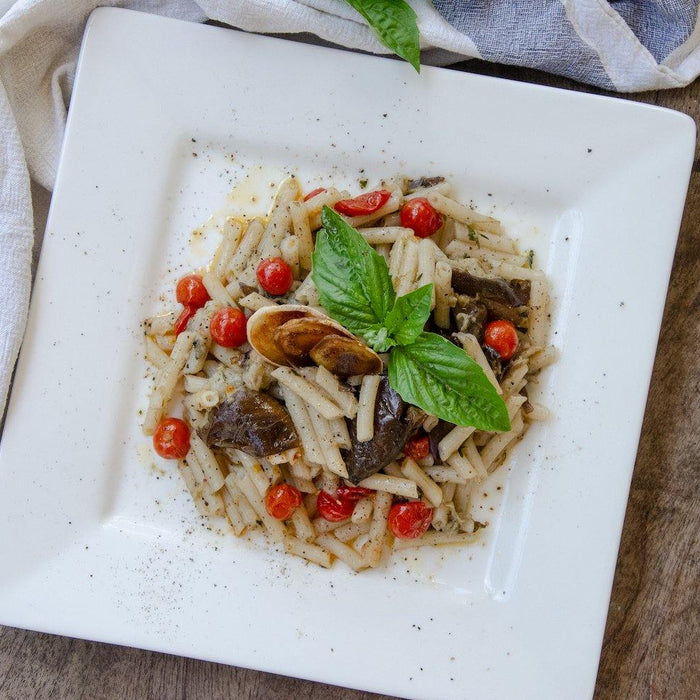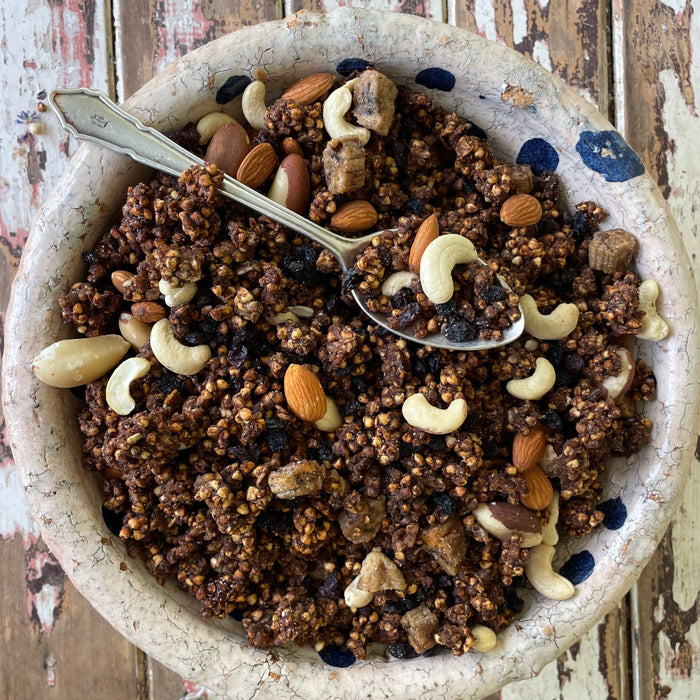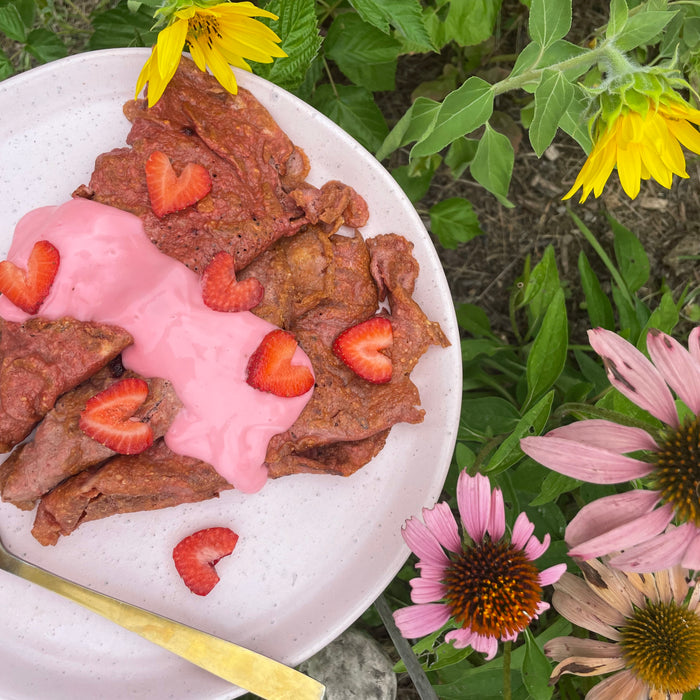Did you know that there are several herbs that specifically support women’s health and wellbeing? From managing symptoms associated with menopause, urinary tract infections to reproductive health - we turn to Mother Nature to see how her earthly offerings can give a helping hand to Womanhood.
The use of plants for healing purposes forms the origin of much modern medicine. Herbs have shown to be useful for their anti-inflammatory, haemostatic, antispasmodic and immuno-stimulatory properties for individual body systems and health conditions.
Consuming herbs for health may help to prevent and manage health complications that many females experience including menstruation, menopause, urinary tract infections, pregnancy and osteoporosis.
Cranberry juice and cranberry extracts have been widely used by many women for the treatment of cystitis, urinary tract infection, (UTI) and other bladder conditions.
With the recent controversy over Hormone Replacement Therapy (HRT), more and more women are turning toward herbal medications for relief of the symptoms of menopause. Such formulas abound on the internet and drug store shelves, but a careful examination of the ingredients will reveal that they are usually a combination of the same botanical derivatives.
Soybeans, yams and related plants are natural sources of estrogen and estrogen-like compounds. These will be common ingredients in herbal supplements for women that are intended to ease the symptoms of menopause.
Ashwaganda is a herbal adaptogen, which means it helps your body to have a larger band width for handling stress. It is our adrenals where we manage stress, but also where we make hormones that support us during and post menopause; so supporting the body with a herbal adaptogen is very helpful. Ashwaganda is a nice gentle supportive anti-inflammatory herb (not a good choice however if you have an over-active thyroid).
Kava Kava and Valerian root are also commonly found in women’s herbal formulas, as they can help with sleep, relaxation and restoring emotional balance.
Black Cohosh has been used in traditional Chinese medicine to provide relief from hot flushes. Black Cohosh is also indicated for the relief of menstrual cramps and period pain, as are Evening Primrose Oil, Dong Quai and Red Raspberry, Chamomile and Ginger Root teas.
Vitex also known as Chaste Tree is sometimes used to treat amenorrhea (absent periods). Research suggests it may regulate hormones related to menstruation and fertility.
The researchers found Vitex, Peony, Black Cohosh and Licorice to be the most effective in managing irregular ovulation and resultant infertility. They also concluded that black cohosh may be helpful in treating metabolic complications of PCOS. (1)
Sage is an herb known for its strong herbal aroma and earthy flavour, it is often used medicinally and as an ornamental plant. Phytoestrogens are plant derived non-steroidal oestrogens that are far milder than human derived oestrogen. Research suggests sage exerts mild phytoestrogenic properties, which could suggest why sage has been used as a remedy for menopausal symptoms, such as flushing, night sweats, heart palpitations muscle and joint pain, anxiety, depression, sleep disorders and sexual desire. (2)
It is common for females to experience brain fog and loss of memory during the peri-menopause and menopause. Sage was researched in a study to demonstrate its encouraging benefits on memory and attention in older adults in a trial using doses of 167 to 1332mg of sage extract. Results revealed a significant development of secondary memory performance as well as accuracy of attention. (3)
Milk Thistle is supportive of the liver. Looking after your liver can help reduce hot flushes and night sweats, as it has extra work to process the fluctuating hormones during the later stages of your menopause transition- if you are not able to process these then you might develop much stronger symptoms. The body also chooses to process toxins first before your body’s own hormones, so Milk Thistle is helpful to support and process both toxins and hormones. Milk thistle is also good for Oestrogen dominant ladies and acne prone ladies due to poor oestrogen metabolism in any age.
Women dealing with sexual, or fertility issues can also find help in the garden, rather than the medicine cabinet. Low libido or decreased sex drive in women can be treated botanically with Damiana Leaf, which has been found in studies to increase sexual desire and pleasure and stimulate arousal in women...Again, estrogen-mimicking herbs such as Black Cohosh can help improve a woman’s sex drive, in pre or postmenopausal women. While not specifically prescribed for female sexual dysfunction, herbs that are known to improve blood flow and stimulate the nervous system can also help alleviate this condition. Ginger Root, Aloe Vera, Gingko Biloba, Guarana, and Passion Flower are some such herbs.
Women dealing with fertility issues may stimulate egg production with many of the same hormone replacing, or hormone mimicking herbs that relieve the symptoms of menopause. Dong Quia, Red Clover, Wild Yam, Tribulus, Nettle and Soy extract have all also been found to increase fertility in women.
Nettle is a great source of vitamins important for healthy menstruation, pregnancy and nursing, including iron, magnesium, and calcium. Its antihistamine properties make it a favorite for lessening springtime symptoms of hay fever and allergies. It is also a galactagogue and can increase milk supply!
Fenugreek is a type of seed that can help increase your breast milk supply. When a woman is breastfeeding her milk supply sometimes might decrease due to stress, fatigue, or a variety of other factors. If you feel like your supply is dwindling, consuming fenugreek can be a simple, effective way to boost your production.
Shatavari is a species of asparagus that is native to India and the Himalayas. It is a general tonic and female reproductive tonic high in isoflavones
Shatavari has been used in menopause as an antispasmodic, against menstrual cramps and as a uterine tonic, helping to regulate uterine function during different stages of the menstrual cycle.
Shatavari exerts oestrogenic mechanisms. In a study, women in the treatment group received 6g of shatavari per day for 10 weeks, the results showed a significant reduction in bone loss and an increase in bone formation was seen compared to those in the placebo group. (4)
Saffron is a spice which originates from a flower called crocus sativus, often known as the 'saffron crocus'.
Saffron has a long history of use for improving mental health, including depression, anxiety and premenstrual syndrome. A number of possible mechanisms of action may explain the mental health benefits of saffron including, improvements in the action of the neurotransmitter serotonin, enhancement of brain functions such as memory and learning, antioxidant effects, and protecting the brain against the damaging effects of chronic stress.
A group of overweight women consumed saffron as potential treatment for stress related eating. After eight weeks, saffron exerted beneficial effects on the women and resulted in a significant decrease in body weight and snacking frequency compared to placebo. (5)
Artichoke leaf: The extracts include the leaf, stem and root which contain higher concentrations of phytonutrients found naturally in the plant. Studies have shown artichoke lowers blood sugar levels and reduces elevated blood cholesterol and triglyceride levels. (6)
Artichoke is a rich source of fructooligosaccharides (FOS) a form of non-digestible fibre. Artichoke also contains levels of inulin a soluble fibre found in the root of chicory plants and artichoke. Both inulin and FOS occur naturally in artichoke and they are effective prebiotics that stimulate the growth of intestinal bifidobacterial. Prebiotics and beneficial bacteria help promote good gut health by enhancing gut associated lymphoid tissue and therefore increasing immune function. Therefore Artichoke leaf is good for females with poor gut, immunity and skin complains.
Special thanks to one of our Naturopaths Jana @thesecret_kitchen for this article.
References:
1) https://www.medicalnewstoday.com/articles/326560#herbal-products
2) S.Bommer., P.Klein & A.Suter (2011) First time proof of sage’s tolerability and efficacy in menopausal women with hot flushes. Advances in therapy. 28. Pg 490-500.
3) Scholey AB, Tildesley NT, Ballard CG, Wesnes KA, Tasker A, Perry EK, Kennedy DO. An extract of Salvia (sage) with anticholinesterase properties improves memory and attention in healthy older volunteers. Psychopharmacology (Berl). 2008
4) Japee, J and Pandya. A Comparative Study on Shatavari and Kukkutanda Twak., M A. 3, s.l. : AYU, (2009) Vol. 30.
5) Gout B., Bourges C., Paineau-Dubreuil S. Satiereal, a Crocus sativus L extract, reduces snacking and increases satiety in a randomized placebo-controlled study of mildly overweight, healthy women. Nutr Res. 2010 May;30(5):305-13.
6) Wider, B., Pittler, M., Coon, J., and Ernst, E. (2013) Artichoke leaf extract for treating hypercholesterolaemia. Cochrane database of systematic reviews.






